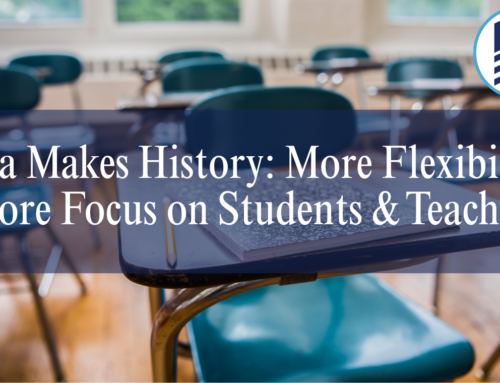
Education is a foundational cornerstone of any well-rounded society. A staple of Western education for centuries, the “3 Rs” are a common and historical reference to “Reading, Writing, and Arithmetic.” For generations, these basic tools have been used to build a strong foundation upon which individual students and teachers can build.
In today’s modern educational models, the necessity and practicality of the traditional 3 Rs have come into question. Are these “old-fashioned” ideas and long-standing basics still worthy of their priority status?
Some argue that the world of education has advanced alongside the age of technology and scientific achievement. “No longer should we prepare our children for the future by cramming them full of the traditional three Rs: ‘reading, writing, and ‘rithmetic,’ because, while not totally irrelevant, the three Rs are no longer the gateway to the future,” suggests Ben Michaelis, Ph.D., “…Education was about helping us to [quickly] obtain and retain information…Anyone with a computer or a phone can access just about any information they need faster than you can finish this sentence.”
Others take a broader, more traditional view. Delphi Academy of Boston suggests that “Education has always gone beyond the basics of ‘reading, writing, and arithmetic.’ However, the ‘Three Rs’ are tools with which a student can gain more knowledge in any subject. If a student can read and write, he or she can complete a research project and learn to type. If a student understands the basics of arithmetic, he or she can learn to program complex algorithms or study science.”
So, what are the fundamental elements of the 3 Rs, and what place do they hold in today’s educational climate?
Reading
According to Wikipedia, “For educators and researchers, reading is a multifaceted process involving such areas as word recognition, orthography (spelling), alphabetics, phonics, phonemic awareness, vocabulary, comprehension, fluency, and motivation.”
In other words, in its most basic form, reading allows an individual to interpret written language on a page. Complementary skills, such as phonetic proficiency and comprehension, by default, accompany reading offer further accomplishments and long-term vocabulary.
Dr. Gene M. Kerns and Dr. Jan Bryan suggest that reading from an early age can have a vital influence on a child’s long-term education. According to their compiled data, proficient third-grade readers were nearly five times more likely to graduate high school than their peers with below-basic reading skills. Students with high reading skills were also found to excel in mathematics in contrast to their counterparts with lower reading abilities.
Research also shows that the reading process improves vocabulary, memory, concentration, reasoning and deductive skills, analytical abilities, and provides a multitude of other real-life benefits. Reading enables students to gain access to the world of written language and provides a portal to an infinite universe of knowledge.
Writing
Writing is, in a sense, reading in reverse. While reading is the ability to obtain information through written communication, writing is the ability to convey thoughts and concepts through the written word. Quality writing involves a complex mental process, requiring an individual to think logically and convey concepts clearly. The writer must be able to lead their readers from point “a” to point “b” without confusion. As a child enters adulthood, the ability to effectively write and communicate will enrich every facet of their life, from personal relationships to a professional career.
The skill of writing by hand also offers particular benefits to students by involving a brain-hand connection and hand-eye coordination. Learning to use a drawing implement to create specific and legible shapes aids a child’s brain development and exercises their fine motor skills.
According to CogniFit’s explanation, “…the brain generates instructions for how the hand has to move in order to create appropriate lines and shapes, resulting in letters. Visual feedback also helps correct erroneous shapes (letters) generated by the previous motor instructions. It is a sequence of fast and precise motor actions.”
Kim Griffin, an occupational therapist and founder of GriffinOT, addresses the importance of handwriting to a child’s development. “Handwriting is an incredibly complex skill … In order to hold their pencil with their fingers children first need to be able to isolate their fingers from their palm… As they have more experience with fine motor activities, children establish more control over their fingers. This is what allows them to hold their pencil with their fingers and eventually develop a dynamic pencil grasp.”
A recent study offers an argument for writing by hand from a neurological standpoint. Audrey van der Meer, a neuroscientist, and professor at NTNU was involved in this study and states, “Writing by hand creates much more activity in the sensorimotor parts of the brain. A lot of senses are activated by pressing the pen on paper, seeing the letters you write, and hearing the sound you make while writing…We both learn better and remember better.”
From basic access to written language to the expression of more complex ideas, writing is a tool that can offer a variety of necessary life skills and neuro connectivity.
Arithmetic
Arithmetic is the last of the 3 Rs. Traditionally, arithmetic has provided a strong foundation for building a greater understanding of general and advanced mathematics.
“In general, arithmetic deals with all of the basic notions of numbers,” states The Story of Mathematics, a collaboration of resources collected by experts in the field. “It also includes the fundamental operations of addition, subtraction, multiplication, division, and their properties.”
Arithmetic instructs students in the basics of math, providing a fundamental understanding upon which their future mathematical education can advance. According to Merrimack College, “Understanding basic math concepts and how to apply them early in their education prepares children to excel as they move into higher grades.”
The study of and education in mathematics has long been recognized as beneficial to individuals of all ages. Arithmetic cultivates an ability to problem solve and also hones a child’s ability to draw logical conclusions, honing their skills for deductive reasoning.
Scholastic offers, “Arithmetic skills are necessary life tools that children must learn. As adults, we use arithmetic daily. We add, subtract, multiply, or divide when we balance our check-books, calculate tips in restaurants, figure out how much wallpaper to buy, finance a car…A person who can’t do arithmetic is handicapped in many situations. Arithmetic should prepare children for real world math.”
As the final “R” in the 3 Rs of education, arithmetic is an essential building block of education that has long-term effects on the life of every student.
The 3 Rs have been a long-standing staple in American education. These basic skills provide a wide variety of important skills beyond the obvious, and students benefit from their use.
The modern world has certainly advanced in knowledge, but these three educational building blocks are timeless basics that should not be discarded. Even in a world with information available at every turn, the 3 Rs continue to be vital foundational tools that enrich a child’s broader education and prepare them to excel as modern adults.





[…] a world of increasing technology and complicated ideas, reading, writing, and arithmetic continue to matter. The famous “3 Rs” equip students with the basic tools they need to learn other subjects and […]
[…] accomplished by building a child’s education on a fundamental foundation, historically known as “The Three R’s”. This is an idea that Appleby strongly […]
[…] was the “3 Rs,” a common historical reference to “Reading, Writing, and Arithmetic.” These were the fundamental tools used to build a strong foundation in education for […]
[…] to college or not, investing in their education is a must for career success. No matter what job, the basics of reading, writing, and math are essential. Without a foundational education, your young adult will struggle to land a decent […]